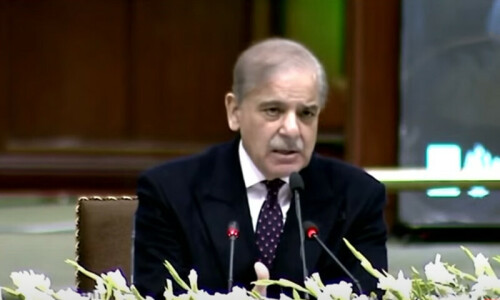Gifted poets are a strange lot. You read their poetry without knowing them; you fall in love with them. You meet them and then read their poetry; you start thinking about them, constantly. That’s the charm of the art of poetry. It creates an aura around poets which sometimes even they themselves are not able to fathom — a magical, enchanting, occasionally disillusioning, aura.
Amar Sindhu is known for her unflinching human rights activism, for her unequivocal support for the underprivileged and for her ability to speak her mind come what may. But not many are aware of her stupendous poetry. The use of the word ‘stupendous’ is well thought out, because that is how I felt when going through her first collection of poems in Sindhi. Lucidly translated into Urdu by Atiya Dawood and introduced by Fahmida Riaz, it stuns, at times astounds the reader with its sensitive imagery and plain, rooted-in-soil metaphors. The title of the book is Ojagial Ankhian Ja Sapna or Jagti Aankhon Ke Sapne.
The title is right on the money, for the poems in the book (accompanied by Khuda Bux Abro’s eye-catching illustrations) have a recurrent theme of dreams — dreams that Amar Sindhu has seen, dreams that she wants to see, dreams that she will never see. The book begins with “Aankh Ka Focus” (The Focus of the Eye) and sets the tone for the rest of the poems written in free verse. However, Sindhu makes sure that the reader is aware of her ideological moorings. The next poem, “Muzahmati Shaeri” (Poetry of Resistance) tells the reader where she’s coming from at an impersonal level (though it’s the personal aspect of her subjects that quantitatively dominates the book). And within that poem, Sindhu unleashes her outstanding ability to create heartfelt metaphors that flow like water down a waterfall. Notice the following six lines taken from the middle of “Muzahmati Shaeri”:
After kissing rebellions — And getting blisters from the journey — My lips and feet Get printed On the blank pages of historybooks written in an unknown language Without a title
Reading this, you know you have to fasten your seat belts. The issue of dreams peppered with delectable similes and readily understandable symbolism reaches a high point in the poem “Muntashir Khwab” (Scattered Dreams). The poem has 20 lines and starts off with a bird’s broken wings and then touches some basic subjects of life, concluding on history — a defining, somewhat lamenting, note.
The dream of a thrush’s broken wings Only the bird knows — The squally wind Causes the dream of the firmament To fall off the trees — The thunderous rain and bread Come together In the dream of a homeless wanderer’s makeshift shack — The dreams of shores hang off the masts of the ship Trapped in a storm — An old man’s stick Taps on time’s bosom And dreams of the eyes — The land blends the eyes that dream with the soil To compile history — And history writes the dirge of dreams With its tears
This may sound like an incoherent piece. It is not. It’s an episodic dream. Or dreams in episodes with a thread which may be formless, but not unintelligible.
Just when the reader thinks that metaphors used to underline a certain historic or sociopolitical context cannot be more sinuous, Sindhu’s romantic verse (which she might not label such) becomes more tender and sore to the touch. Notice this very short poem:
I have thirst Will you Be my river? I have fatigue Will you Be my shade?
On the surface, these are unadorned, uncomplicated lines. Actually it is not so much the words that create an ambience of yearning. It is the tone of the poem which bares the personality and unmasks the persona of the poet.
“Saleeb Per Latakti Muskurahat” (A Smile on the Cross) and “Mohenjo Daro Ki Aakhri Cheekh” (Mohenjo Daro’s Last Cry) elevate the book to an impersonal, conscientious level where Sindhu uses her love for the land she was born and brought up in and wants to rid it of the things that have bedeviled it for long. This she does not do without a profound sense of history. Sindhu knows what has gone wrong and what could set it right. But like a true poet, she rues what’s done and dusted, and longs for what can be had.
As if by virtue of a natural progression, the book moves towards its end rather sedately — short poems with ambient lines as if the poet is about to dose off at the end of the book so that she could lose herself in a dream.
The evening Which came back from you, longing Today I had my evening tea with it
And in the end: The solitude of the heart Only friends lament
Highly recommended!
Ojagial Ankhian Ja Sapna or Jagti Aankhon Ke Sapne (POETRY) By Amar Sindhu Women’s Research and Publications, Hyderabad ISBN 978-969-9698-00-2 99pp. Rs400
















































